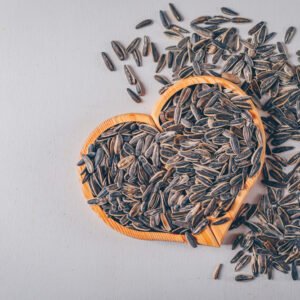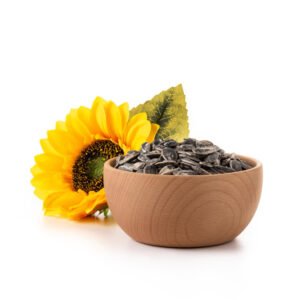Oil seeds pack a serious nutritional punch in tiny packages. These small but mighty foods deliver healthy fats, protein, fiber, vitamins, and minerals that support your body in multiple ways. If you want to boost your nutrition without overhauling your entire diet, adding the right oil seeds can make a real difference.
Let’s break down which oil seeds deserve a spot in your kitchen and why they matter for your health.
Understanding Oil Seeds and Their Nutritional Value
Oil seeds are exactly what they sound like: seeds that contain natural oils. These oils provide essential fatty acids your body cannot produce on its own. The term covers popular options like flaxseeds, chia seeds, sesame seeds, sunflower seeds, and pumpkin seeds.
What makes these seeds special? They contain polyunsaturated and monounsaturated fats, the kinds that support heart health and reduce inflammation. Many oil seeds also provide plant-based protein, making them perfect for vegetarians and vegans looking to meet their protein needs.
The best oil seeds for health share common characteristics. They offer omega-3 fatty acids, fiber, antioxidants, and minerals like magnesium and zinc. Your body uses these nutrients to maintain everything from cardiovascular function to immune response.
Also Read:- Health Benefits of Soybean Cake You Should Know
Top Oil Seeds for Daily Nutrition
Flaxseeds: The Omega-3 Powerhouse
Flaxseeds stand out as one of the richest plant sources of alpha-linolenic acid (ALA), a type of omega-3 fatty acid. These small brown or golden seeds contain about 8 grams of fiber per ounce, supporting digestive health and helping you feel full longer.
Research shows that flaxseeds may help lower cholesterol levels and blood pressure. The lignans in flaxseeds act as antioxidants, protecting cells from damage. For maximum nutrient absorption, grind flaxseeds before eating them. Whole flaxseeds can pass through your digestive system intact.
Add ground flaxseed to smoothies, oatmeal, or yogurt. You can also use it as an egg substitute in baking by mixing one tablespoon of ground flaxseed with three tablespoons of water.
Chia Seeds: Fiber and Protein Combined
Chia seeds deliver an impressive nutritional profile in a tiny package. One ounce provides about 11 grams of fiber, nearly half your daily requirement. These seeds also contain complete protein with all nine essential amino acids.
The unique property of chia seeds? They absorb up to ten times their weight in water, forming a gel-like consistency. This expansion helps you feel satisfied and can support healthy blood sugar levels by slowing digestion.
Chia seeds work well in puddings, smoothies, and baked goods. You can sprinkle them on salads or mix them into energy bars. Unlike flaxseeds, you can eat chia seeds whole and still absorb their nutrients.
Sesame Seeds: Mineral-Rich Nutrition
Sesame seeds bring more than just flavor to your food. These tiny seeds pack substantial amounts of calcium, magnesium, and zinc. One ounce provides about 25% of your daily copper needs, supporting red blood cell formation and immune function.
Sesame seeds contain sesamin and sesamolin, lignans that may help protect liver health and provide antioxidant benefits. The seeds come in white, black, and brown varieties, each offering similar nutritional value.
Toast sesame seeds to bring out their nutty flavor. Use them in stir-fries, on roasted vegetables, or ground into tahini paste. Black sesame seeds add visual appeal to dishes while providing the same health benefits.
Sunflower Seeds: Vitamin E Source
Sunflower seeds serve as an excellent source of vitamin E, a powerful antioxidant that protects cells from oxidative stress. Just one ounce delivers about 50% of your daily vitamin E requirement.
These seeds also provide selenium, a mineral that supports thyroid function and DNA production. The combination of vitamin E and selenium makes sunflower seeds particularly beneficial for immune health.
Snack on raw or roasted sunflower seeds, add them to salads, or blend them into homemade seed butter. Remove the shells before eating to avoid digestive discomfort.
Pumpkin Seeds: Magnesium and Zinc
Pumpkin seeds, also called pepitas, contain high levels of magnesium and zinc. Magnesium supports muscle and nerve function, blood sugar regulation, and bone health. Zinc plays a role in immune function, wound healing, and protein synthesis.
These green seeds provide plant-based protein and healthy fats. They also contain phytosterols, compounds that may help reduce cholesterol absorption in the intestines.
Roast pumpkin seeds with spices for a crunchy snack, toss them in soups, or blend them into pesto. You can eat both the shelled and unshelled varieties, though the green kernels inside provide easier digestion.
How Oil Seeds Support Specific Health Goals
Heart Health and Cholesterol Management
The best oil seeds for health contribute to cardiovascular wellness through multiple pathways. The omega-3 fatty acids in flaxseeds and chia seeds help reduce inflammation in blood vessels. Monounsaturated fats in sesame and pumpkin seeds support healthy cholesterol ratios.
Studies suggest that regular consumption of these seeds can help lower LDL (bad) cholesterol while maintaining or raising HDL (good) cholesterol. The fiber content also binds to cholesterol in the digestive tract, preventing its absorption.
Plant sterols in sunflower and pumpkin seeds compete with cholesterol for absorption in your intestines. This natural blocking mechanism can lead to measurable reductions in blood cholesterol levels when you consume these seeds regularly.
Blood Sugar Control
Oil seeds help stabilize blood sugar through their combination of protein, healthy fats, and fiber. This trio slows down carbohydrate digestion, preventing rapid spikes in blood glucose after meals.
Chia seeds form a gel when mixed with liquid, further slowing stomach emptying and glucose absorption. This property makes them particularly useful for people managing diabetes or prediabetes.
The magnesium in pumpkin seeds and sunflower seeds supports insulin function. Better insulin sensitivity means your cells can more effectively use glucose from your bloodstream.
Weight Management
Despite their calorie density, oil seeds can support healthy weight management when eaten in appropriate portions. The protein and fiber keep you feeling satisfied between meals, reducing the temptation to snack on less nutritious options.
The healthy fats in these seeds provide sustained energy without causing blood sugar crashes. This steady energy supply helps you maintain consistent activity levels throughout the day.
Replace refined snacks with a small handful of seeds. The nutritional density means you get more nutrients per calorie compared to processed foods.
Practical Ways to Include Oil Seeds in Your Diet
Start small if you’re new to eating seeds. A tablespoon or two provides significant nutritional benefits without overwhelming your digestive system. You can gradually increase to about an ounce (roughly three tablespoons) of mixed seeds daily.
Create a seed blend combining flaxseeds, chia seeds, sesame seeds, sunflower seeds, and pumpkin seeds. Store this mixture in an airtight container in your refrigerator. Sprinkle it on breakfast bowls, salads, or roasted vegetables.
Blend seeds into smoothies for a nutrition boost without changing the texture much. Ground flaxseed works particularly well in smoothies, adding thickness and omega-3s.
Make homemade seed crackers by mixing ground seeds with water and seasonings, then dehydrating or baking until crispy. These crackers provide a satisfying crunch with more nutrition than store-bought options.
Add seeds to baked goods like muffins, bread, and energy balls. They add texture and nutrition without dramatically changing recipes.
Choosing Quality Oil Seeds
Quality matters when selecting oil seeds. Look for seeds that appear uniform in color and size, free from mold or discoloration. Fresh seeds should smell pleasant and slightly nutty, not rancid or musty.
Buy from suppliers who prioritize quality and proper storage. CMS Industries offers premium oil seeds sourced directly from farmers, ensuring freshness and nutritional content. Their range includes various oil seeds suitable for both direct consumption and oil extraction.
Store seeds properly to maintain their nutritional value. Keep them in airtight containers away from heat, light, and moisture. Refrigeration extends shelf life, especially for ground flaxseed and chia seeds.
Check expiration dates when purchasing packaged seeds. While whole seeds stay fresh longer than ground versions, all seeds eventually oxidize and lose potency.
The Role of Oil Seed Suppliers
Reliable suppliers make a difference in seed quality and availability. Agricultural companies like CMS Industries specialize in sourcing and distributing premium oil seeds to markets worldwide.
These suppliers work directly with farmers to ensure sustainable practices and fair compensation. They also implement quality control measures, testing seeds for purity, moisture content, and contamination.
When you choose seeds from established suppliers, you get products that meet food safety standards and maintain consistent quality. This consistency matters for both nutritional value and culinary results.
Potential Considerations and Precautions
While oil seeds offer numerous health benefits, some people need to exercise caution. If you have diverticulitis or similar digestive conditions, consult your doctor before adding seeds to your diet. Some medical professionals recommend avoiding seeds during flare-ups.
Start with small amounts to assess tolerance. The high fiber content can cause bloating or gas if you increase intake too quickly. Drink plenty of water when eating seeds to help fiber move through your digestive system.
People with allergies to tree nuts should introduce seeds carefully, as cross-reactivity can occur. Sesame and sunflower seed allergies exist, though they’re less common than peanut or tree nut allergies.
Watch portion sizes, as seeds are calorie-dense. While the calories come with nutrition, eating excessive amounts can contribute to unwanted weight gain.
Making Oil Seeds Part of Your Routine
Consistency brings the best results with oil seeds. Rather than eating large amounts occasionally, make them a daily habit. Keep seeds visible in your kitchen as a reminder to use them.
Set a goal to include at least two different types of seeds in your diet each day. This variety ensures you get a broad range of nutrients rather than relying on a single source.
Experiment with different preparation methods. Toasting seeds brings out deeper flavors. Soaking chia seeds creates pudding-like textures. Grinding flaxseeds improves nutrient absorption.
Track how you feel after adding seeds to your diet. Many people notice improved energy, better digestion, and more stable appetite within a few weeks.
Connect With Quality Agricultural Products
Finding reliable sources for your oil seeds matters for both quality and sustainability. CMS Industries stands as a trusted supplier of agricultural products, including a diverse range of oil seeds. Their commitment to quality ensures you receive seeds that retain maximum nutritional value.
Whether you need seeds for personal consumption or commercial purposes, working with established suppliers guarantees consistent product standards. Visit CMS Industries to explore their selection of premium oil seeds and other agricultural products.
Frequently Asked Questions
Q.Which oil seed has the most omega-3 fatty acids?
Flaxseeds contain the highest concentration of omega-3 fatty acids among common oil seeds. A single tablespoon provides about 2.5 grams of ALA omega-3s. Chia seeds come in second place, offering approximately 2 grams per tablespoon. These plant-based omega-3s differ from fish oil but still provide anti-inflammatory benefits for heart and brain health.
Q.Can I eat different oil seeds together every day?
Yes, combining various oil seeds maximizes nutritional benefits. Each seed type offers unique vitamins, minerals, and fatty acid profiles. Eating a mixture ensures you get comprehensive nutrition. Try blending flaxseeds, chia seeds, pumpkin seeds, sunflower seeds, and sesame seeds in equal parts. Store this mix in your refrigerator and add one to two tablespoons daily to meals.
Q.Should I eat oil seeds raw or roasted?
Both raw and roasted seeds offer health benefits, though heat can reduce some nutrients. Raw seeds retain more omega-3 fatty acids and vitamin E. Roasting enhances flavor and makes seeds more digestible for some people. Light toasting at low temperatures preserves most nutrients while improving taste. Choose based on your preference and digestive comfort.
Q.How much oil seeds should I eat daily?
One to two ounces of mixed oil seeds daily provides excellent nutritional benefits without excessive calories. This equals roughly three to six tablespoons. Start with smaller amounts if you’re new to eating seeds, gradually increasing to avoid digestive discomfort. The fiber content requires adequate water intake to prevent constipation and support proper digestion.
Q.Do oil seeds go bad and how should I store them?
Oil seeds can become rancid when exposed to heat, light, or air. Whole seeds last six months to one year at room temperature in sealed containers. Refrigeration extends shelf life to one to two years. Ground flaxseed should always be refrigerated and used within a few months. Sniff seeds before using; rancid seeds smell off or paint-like and should be discarded.




